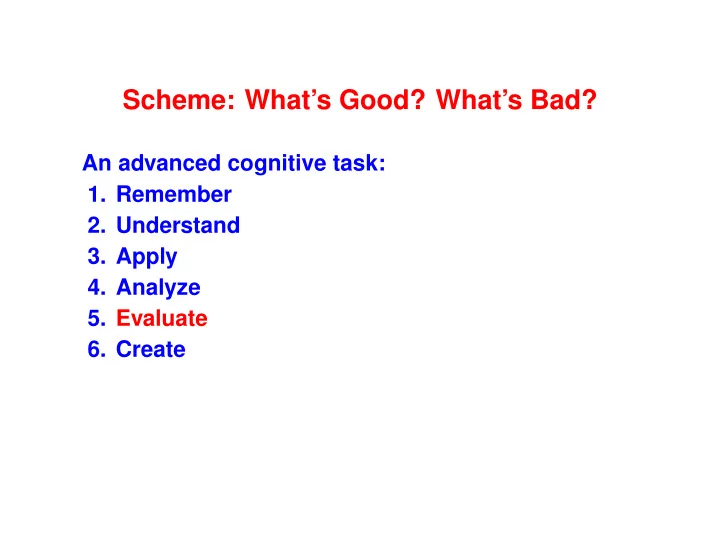

Scheme: What’s Good? What’s Bad? An advanced cognitive task: 1. Remember 2. Understand 3. Apply 4. Analyze 5. Evaluate 6. Create
Length fun length [] = 0 | length (x::xs) = 1 + length xs val res = length [1,2,3]
Map fun map f [] = [] | map f (x::xs) = (f x) :: (map f xs) val res1 = map length [[], [1], [1,2], [1,2,3]]
Map, without redundant parentheses fun map f [] = [] | map f (x::xs) = f x :: map f xs val res1 = map length [[], [1], [1,2], [1,2,3]]
Filter fun filter pred [] = [] | filter pred (x::xs) = (* no ’pred?’ *) let val rest = filter pred xs in if pred x then (x :: rest) else rest end val res2 = filter (fn x => (x mod 2) = 0) [1,2,3,4]
Filter, without redundant parentheses fun filter pred [] = [] | filter pred (x::xs) = (* no ’pred?’ *) let val rest = filter pred xs in if pred x then x :: rest else rest end val res2 = filter (fn x => (x mod 2) = 0) [1,2,3,4]
Exists fun exists pred [] = false | exists pred (x::xs) = (pred x) orelse (exists pred xs) val res3 = exists (fn x => (x mod 2) = 1) [1,2,3,4] (* Note: fn x => e is syntax for lambda *)
Exists, without redundant parentheses fun exists pred [] = false | exists pred (x::xs) = pred x orelse exists pred xs val res3 = exists (fn x => (x mod 2) = 1) [1,2,3,4] (* Note: fn x => e is syntax for lambda *)
All fun all pred [] = true | all pred (x::xs) = (pred x) andalso (all pred xs) val res4 = all (fn x => (x >= 0)) [1,2,3,4]
All, without redundant parentheses fun all pred [] = true | all pred (x::xs) = pred x andalso all pred xs val res4 = all (fn x => (x >= 0)) [1,2,3,4]
Take exception TooShort fun take 0 _ = [] (* wildcard! *) | take n [] = raise TooShort | take n (x::xs) = x :: (take (n-1) xs) val res5 = take 2 [1,2,3,4] val res6 = take 3 [1] handle TooShort => (print "List too short!"; []) (* Note use of exceptions. *)
Take, without redundant parentheses exception TooShort fun take 0 _ = [] (* wildcard! *) | take n [] = raise TooShort | take n (x::xs) = x :: take (n-1) xs val res5 = take 2 [1,2,3,4] val res6 = take 3 [1] handle TooShort => (print "List too short!"; []) (* Note use of exceptions. *)
Drop fun drop 0 zs = zs | drop n [] = raise TooShort | drop n (x::xs) = drop (n-1) xs val res7 = drop 2 [1,2,3,4] val res8 = drop 3 [1] handle TooShort => (print "List too short!"; [])
Takewhile fun takewhile p [] = [] | takewhile p (x::xs) = if p x then (x :: (takewhile p xs)) else [] fun even x = (x mod 2 = 0) val res8 = takewhile even [2,4,5,7] val res9 = takewhile even [3,4,6,8]
Takewhile, without redundant parentheses fun takewhile p [] = [] | takewhile p (x::xs) = if p x then x :: takewhile p xs else [] fun even x = (x mod 2 = 0) val res8 = takewhile even [2,4,5,7] val res9 = takewhile even [3,4,6,8]
Dropwhile fun dropwhile p [] = [] | dropwhile p (zs as (x::xs)) = if p x then (dropwhile p xs) else zs val res10 = dropwhile even [2,4,5,7] val res11 = dropwhile even [3,4,6,8] (* fancy pattern form: zs as (x::xs) *)
Dropwhile, without redundant parentheses fun dropwhile p [] = [] | dropwhile p (zs as (x::xs)) = if p x then dropwhile p xs else zs val res10 = dropwhile even [2,4,5,7] val res11 = dropwhile even [3,4,6,8] (* fancy pattern form: zs as (x::xs) *)
Folds fun foldr p zero [] = zero | foldr p zero (x::xs) = p (x, (foldr p zero xs)) fun foldl p zero [] = zero | foldl p zero (x::xs) = foldl p (p (x, zero)) xs val res12 = foldr (op +) 0 [1,2,3,4] val res13 = foldl (op * ) 1 [1,2,3,4] (* Note ’op’ to use infix operator as a value *)
Folds, without redundant parentheses fun foldr p zero [] = zero | foldr p zero (x::xs) = p (x, foldr p zero xs ) fun foldl p zero [] = zero | foldl p zero (x::xs) = foldl p (p (x, zero)) xs val res12 = foldr (op +) 0 [1,2,3,4] val res13 = foldl (op * ) 1 [1,2,3,4] (* Note ’op’ to use infix operator as a value *)
ML—Five Questions Values: num/string/bool, constructed data Syntax: definitions, expressions, patterns, types Environments: names stand for values (and types) Evaluation: uScheme + case and pattern matching Initial Basis: medium size; emphasizes lists (Question Six: type system—a coming attraction)
A note about books Ullman is easy to digest Ullman costs money but saves time Ullman is clueless about good style Suggestion: • Learn the syntax from Ullman • Learn style from Ramsey, Harper, & Tofte Details in course guide Learning Standard ML
Recommend
More recommend